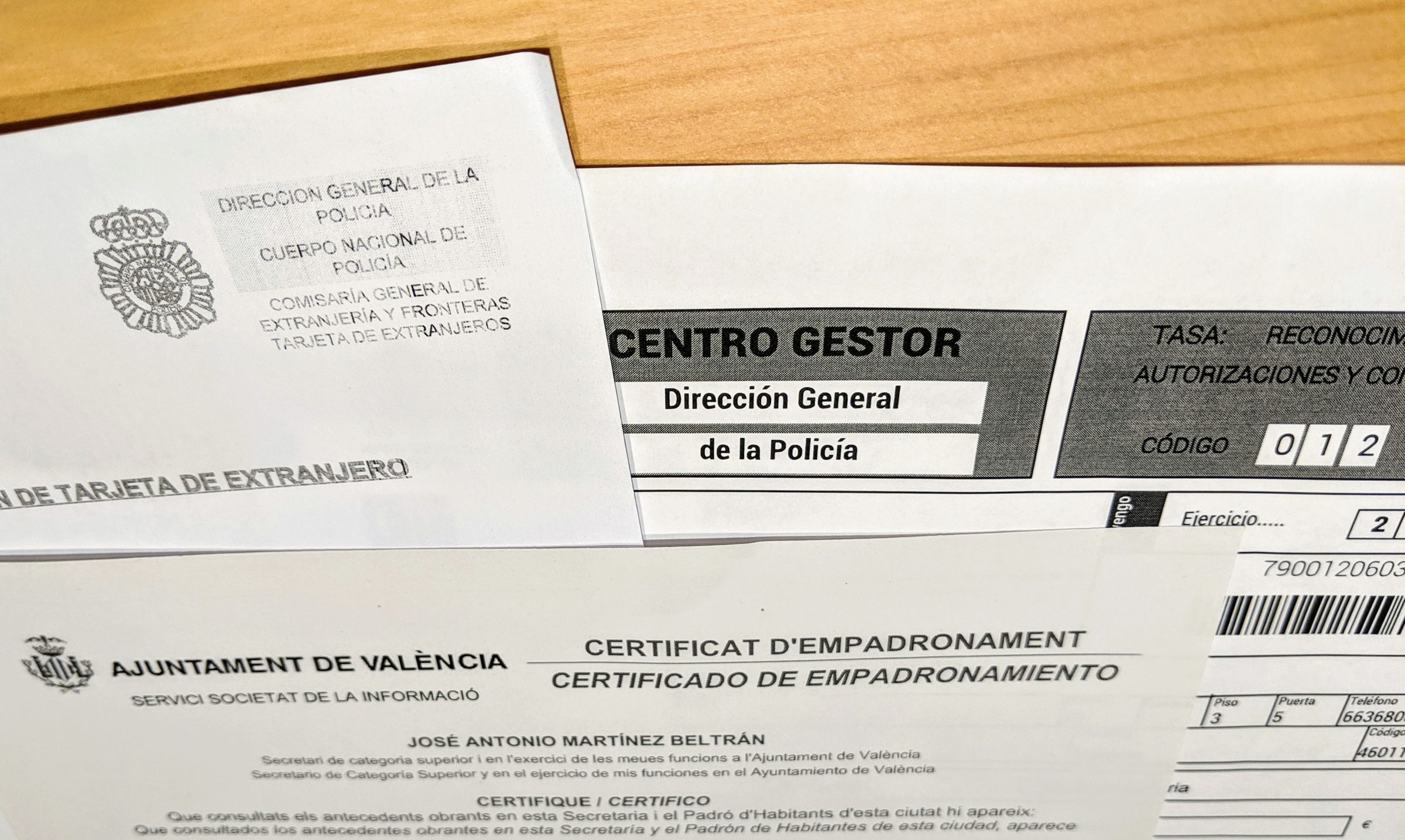As mentioned before, the process to gather all of my documents and to apply for my Spanish non-lucrative visa was actually MUCH smoother and quicker than I anticipated. I got all my paperwork ready in one week and my visa was approved in only 10 days.
You can read my detailed instructions on how to apply for the Spanish non-lucrative visa here:
Non Lucrative Visa for Spain: How I Applied in Just 1 Week
However, once the non-lucrative visa has been issued, that’s only the first step. You must complete the next steps once you arrive in Spain in order to get your Spanish Residency Card (TIE).
The Next Step: TIE – Tarjeta de Identidad de Extranjero (Spanish Residency Card)
Once your visa is approved and you either pick up your visa at the Spanish consulate or receive your passport with visa in the mail (whichever option you chose), keep in mind that…
1. You have 3 months to enter Spain from the date your visa was issued
AND
2. Once in Spain, you need to apply for your TIE (Spanish Residency Card) within 30 days
The first part is easy. Just make sure you enter Spain within 3 months of your visa issue date!
The second part is more complicated. But now that I’ve completed the process, I’m going to share every detail on how to get your TIE once in Spain.
Step 1: Certificado de Empadronamiento
In order to get your TIE, you will most likely need to get this certificate from the City Hall first.
Not every city in Spain requires this document for a TIE but many do and here in Valencia, they definitely require it. This is basically an official certificate that shows you are registered as a resident of a particular city or town in Spain. The certificate is typically issued by the City Hall in the town or city where you plan to live in Spain.
With this official document, your life as a resident becomes much easier. Consider it official proof of residency and address, something that comes in handy when dealing with other government offices (such as the office that handles the Spanish Residency Card process).
How to Obtain a Certificado de Empadronamiento
- Passport – Make 2 copies of the details page, your residency visa and your entry stamp into Spain or the Schengen zone. Bring the original passport and copies with you.
- Proof of address – You’ll need a rental contract for a house or apartment that is valid for at least 6 months. Bring the original signed version and a photocopy. (If you are renting a room from someone or staying with family/friend, the owner of the residence might need to come with you to the appointment and they might need to bring a recent utility bill in their name. The rules vary depending on the city/town where you are living.)
- Proof of rent payment – Bring a copy of the receipt you received when you paid your first month’s rent.
- Make an appointment – Check the City Hall’s website and see if you need to make an appointment. Some cities require appointments (such as Valencia) and some cities allow you to simply show up at the City Hall. For Valencia, you can make an appointment here: Cita Previa. Simply choose “Padron” from the list and then fill out the rest of the form.
- Go to the appointment – Show up at the City Hall for your appointment with all the documents above.
For me, once my number was called, the process took about 5 minutes. I gave the woman behind the desk my documents, she asked a couple of quick questions (my level of education, if it was my first time registering in Spain, why I needed the certificate, etc.) and then she printed out two copies of the official certificate right then and there.
That was it. I had the Certificado de Empadronamiento and I was ready to continue the TIE process.
*If you don’t speak any Spanish, you will probably want to have a Spanish-speaking friend or contact come with you.
Step 2: Make an Appointment for your TIE
You can do this before you get your Certificado de Empadronamiento. The only thing to keep in mind is:
- In some cities, you don’t receive your Certificado de Empadronamiento while you wait.
- You might have to return to the City Hall after a few business days to collect your certificate.
- It takes time to gather the other documents you need for your TIE appointment.
Overall, if you allow for at least 2 weeks between your appointment for your Certificado de Empadronamiento and your appointment for your TIE card, you should be good.
Appointment Wait Times
Don’t be alarmed if there are no available TIE appointments for 4 or more weeks. It’s apparently common in some cities for there to be long waits for available appointments. But even though you technically need to apply for your Spanish residency card within 30 days of arriving in Spain, it seems that this rule is ignored. In reality, it has to be ignored since it’s common to wait over a month to get an appointment! So, if the available appointments are 1 or more months away, don’t worry, just book the earliest one you can.
Here’s how to book your TIE appointment:
- Visit this government website
- Choose your province from the drop down list
- On the next page, choose “Policia – Toma de Huellas (Expedicion de tarjeta) Y Renovacion de Tarjeta de Larga Duracion“
- Click “Entrar” on the next page
- Fill out the form with your NIE number (it’s on your visa), your name and country of nationality (Leave the “Fecha de Caducidad de su tarjeta actual” blank.)
- On the next page, fill out your telephone number and email address and choose “Solicitar cita”
- A drop down menu will appear with the office locations you can choose from (I only had one option but you might have more)
- You’ll be taken to a page with a calendar
- Choose a day/time that works for you and confirm your appointment
*Important: Be sure to save the confirmation that appears on your screen as you will absolutely need to take this confirmation paper to your appointment!
*Important: The available appointments change all the time. Keep checking. When I went on the site the first time, the earliest appointment was 4 weeks away. But then I checked one day later and suddenly appointments were available later that same week.
*Important: You need a separate appointment for each person if you are applying as a couple or family.
Step 3: Gather your Documents
Here is a list of everything you need for the TIE appointment:
- Passport – Take the original and 2 photocopies of your passport details page, your visa and the entry stamp you received at immigration when entering Spain, or whichever country in the Schengen zone that you entered first.
- 3 recent passport photos (headshots)
- Appointment confirmation – Two copies of your appointment confirmation document that you saved after making the appointment.
- Resolution letter – This Carta de Resolucion is a simple document that confirms that you did indeed apply for and receive your non-lucrative visa. Yes, even though you have the visa in your passport, you might still need this document. Luckily, it’s very easy to obtain. Visit this official website, fill out the form with your NIE number (it’s on your visa), the date you initially applied for your visa and your year of birth. Click “Consultar” and you’ll be taken to a screen with the details of your visa. Print out two copies of this confirmation.
- Proof of address – Even though I had the Certificado de Empadronamiento, which proves I’m an official resident at the address I listed in Valencia, I still took my official apartment rental contract with me (original and photocopy) as extra insurance.
- Application form – Fill out the TIE application form (Form Modelo EX17) and bring two copies with you. In the end, they didn’t ask for it but I’ve heard that some offices do want the application.
- Form 790 – Codigo 012 – This is the form that helps you pay the fee for your TIE card. You need to fill out the form online, download it, print it out, sign it and then take it to a bank.
-
When filling out Form 790-012:
- – Fill out the entire first section (Identificacion).
- – In the Autoliquidacion section, check the circle next to “TIE que documenta la primera concesión de la autorización de residencia temporal, de estancia o para trabajadores transfronterizos“. Do not do anything else in this section.
- – Under “Localidad”, enter the city in Spain where you are living.
- – Under “Ingreso”, choose “En efectivo” (paying in cash).
- – Download the completed form (all 3 pages) by clicking on the blue button at the bottom.
You’ll now need to print out the form, sign it and take it to the bank (in Spain) to pay the fee.
I was told you could go to any bank to do this but I had some difficulties. The first bank told me I could only get this done between 9:30am – 11:00am on Mondays and Thursdays, the second bank just said ‘no’ and the third bank told me to come back the next day. But then I found a tiny branch of Caixa Popular Bank and they helped me take care of it in 3 minutes. Just don’t save this part until the last second!
The current fee for the TIE is 15,74 Euros. You simply pay that amount, the banker stamps your form and you’re good to go.
Keep the stamped form as you’ll need it for your appointment.
*Get a Spanish phone number!: I use Google Fi and can use my US phone number all over the world. However, I did get a local Spanish SIM card from Vodafone so that I could list a Spanish phone number on my documents. This is important as they might not accept a foreign phone number on the forms and in the government registration system.
It’s easy though. It costs 10 EUR at Vodafone for the SIM (comes with 5 GB of data too). I never put the SIM in my phone but at least I can give out that Spanish number and I avoid confusion.
Step 4: Attend your Spanish Residency Card Appointment
Again, if you don’t speak any Spanish, this could be a challenge to do on your own as the staff at the Valencia office didn’t speak any English. I’ve heard the same about most TIE offices in the country. You might want to bring a local friend or contact to assist.
- Arrive for your appointment 20-30 minutes early.
- Wait. (In Valencia, the process was quite organized. You wait outside the building in a line that is arranged by appointment time. Once it’s your turn, they call you inside and you take a seat in the small waiting area. You’ll then be called to one of the desks within a few minutes.)
- Hand over everything they ask for.
- They’ll take your fingerprints.
- You’ll receive a piece of paper confirming your residency.
- They’ll tell you to come back in 1 month to pick up your Spanish Residency Card.
And that’s it.
Then, after 30 days, you can go back and pick up your Spanish Residency Card. You don’t need an appointment for this, just show up and get in the appropriate line.
Good luck and if you have any questions, just let me know!
The post Spanish Residency Card (TIE): All You Need to Know appeared first on Wandering Earl.














